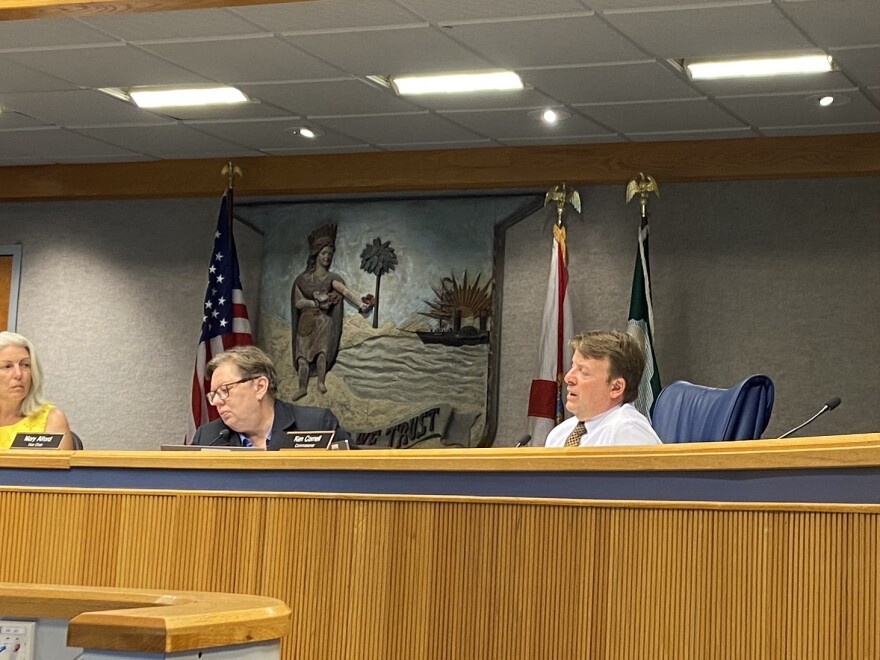The Alachua County Board of County Commissioners voted Tuesday to extend a pilot program that promotes affordable housing for disenfranchised families.
The Energy Efficiency and Weatherization of Affordable Housing Program has been in effect from January to September with the goal of reducing energy insecurity to bring down overall living expenses.
The repair program manager for Rebuilding Together North Central Florida, Julie Emminger, works with contractors to determine which updates are needed in the rental homes. She helps get quotes for how much the upgrades will cost and coordinates with contractors to make sure the work gets done.
“At best,… [the home] just needs a little bit of upkeep,” Emminger said at the County Commission meeting Tuesday. “At worst, it’s deplorable.”
The pilot program focused on low-income and marginalized populations who are unable to afford necessary energy updates and need assistance to pay for their utilities.
The program funded infrastructure tune-ups for 32 residents in 17 households. Program participants represented a diverse group: 50% were white, 34% were Black and 16% were Hispanic or Latin American, Native American or multiracial. All participants earn incomes that are 50% or less of the area median income.
This program works by offering energy efficiency upgrades in exchange for a commitment from the landlord to keep the rental unit affordable. The amount of money provided depends on how long the landlord commits to maintaining the unit’s affordability.
Keeping the unit affordable, in this case, means capping rent increases at the inflation rate and only allowing annual increases. Any increase beyond this rate requires justification. To be justified, the rent must match pricing at nearby apartments to show it is in line with the market.
Betsy Riley, the sustainability manager for Alachua County, is part of the Strategic Initiatives Office and works on strategic planning for the program. Riley also works with local community organizations to spread the word about the program. Some of these organizations work to place low-income tenants into units, which can be mutually beneficial for the landlords and tenants.
Landlords of rental properties can receive as much as $15,000 per rental unit to pay for energy efficiency improvements. Units must remain affordable for low-income families accepted into the units.
Not all renters are eligible, though.
The program requires the rental unit to be in unincorporated areas of the county, meaning residents within Gainesville city limits aren’t eligible. Also, the unit can only be for a single-family, duplex or quadplex. Furthermore, the property can’t have structural or safety issues.
The program is also designed for low-income members of the community, so it outlines requirements to determine who is in need of the program. The tenant must have some form of income and pay for their utilities as well as meet other qualifications to be eligible.
The Board of County Commissioners provided funding for the pilot program through the American Rescue Plan State and Local Fiscal Recovery Funds. The budget for the pilot was $337,000, and the full program called for a budget of $3 million.
The pilot only used $58,500 of its budget. Riley explained that this was a result of the first couple months of the pilot being used to build the program and prepare for back-end factors necessary for a successful program, such as contracting and hiring staff.
County Commissioner Ken Cornell said he was hesitant to approve the full program because of questions he had pertaining to the pilot.
“I think it’s a great idea,” Cornell said. “But I’m not ready to move forward with this proposal until we have at least some success in the pilot.”
He said he wanted to wait for more success before allocating more funds to the program.
Riley’s recommendation was to adopt the full Energy Efficiency Program. The board decided to extend the pilot program and continue working to improve it rather than adopt the full program.
Riley said, “By continuing the pilot, that gives us an opportunity to go back and make corrections.”
The next step for Emminger and Riley is to put the current units they’re assisting through the rest of the program.
“While all 17 homes got basic energy efficiency and weatherization upgrades, they haven’t got the full benefits of the program," Riley said.
The 17 units received pre-assessments, which included making sure the structural and safety requirements for the program were met, completing weatherization tune-ups and determining the home’s biggest energy inefficiencies.
The next step is completing improvements to the larger inefficiencies they found in the pre-assessment. No home has completed the full program yet.
In addition to putting the current units through the remainder of the program, other expansions to the program are being considered.
A follow-up discussion will be held at a County Commission meeting in March 2024. This will include conversations about whether to expand into incorporated areas within Gainesville rather than solely unincorporated areas in the county.
The County Commission will also consider expanding the program to assist homes with six or eight units instead of only homes with four units or less.
Riley said more work is needed. “I’m proud of what we’ve accomplished during the pilot.”



